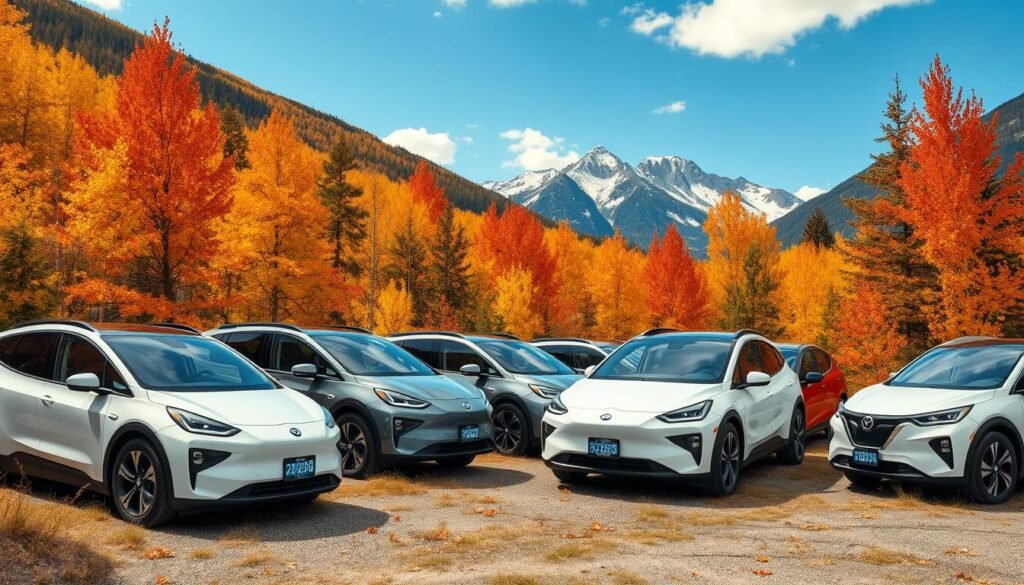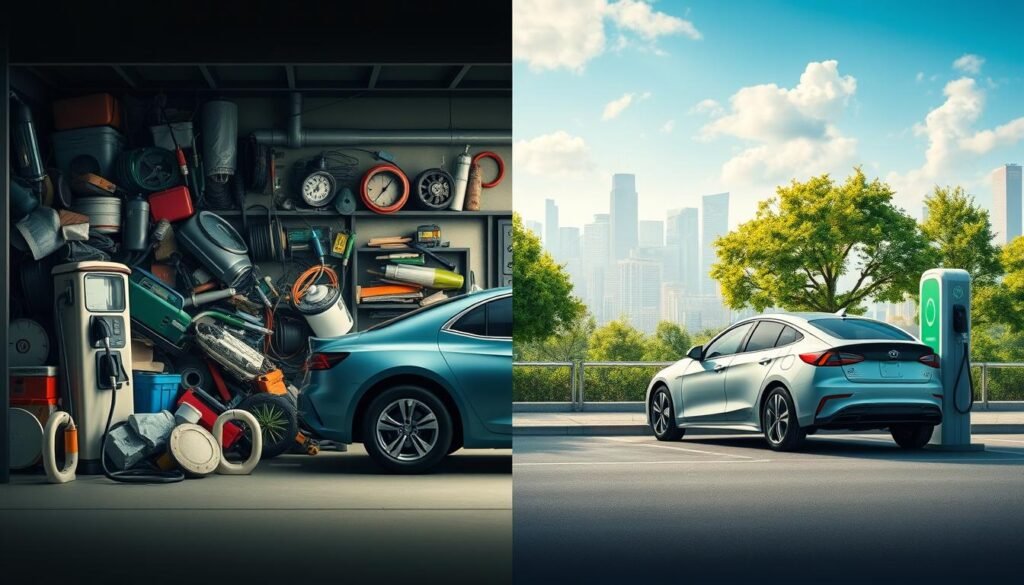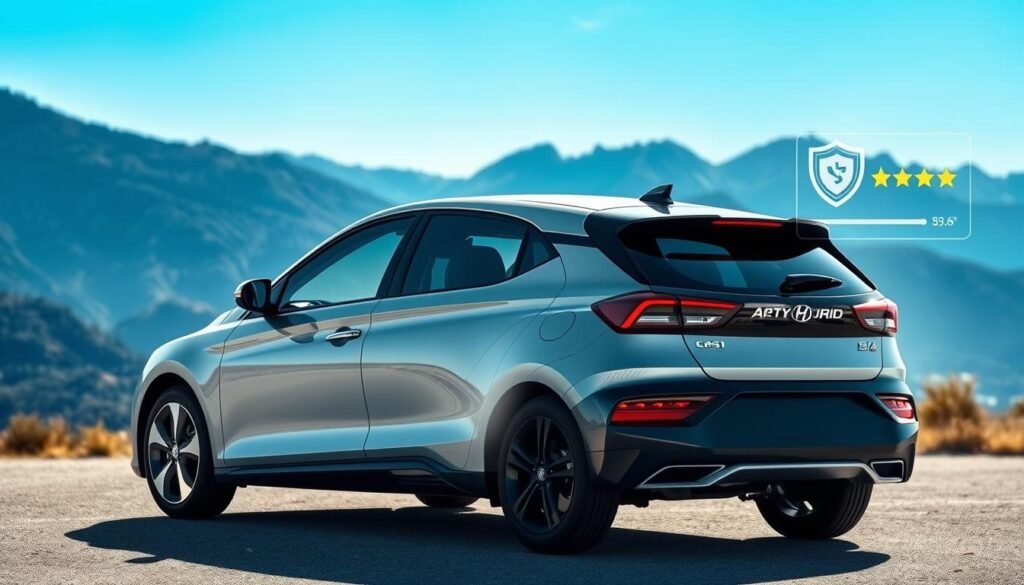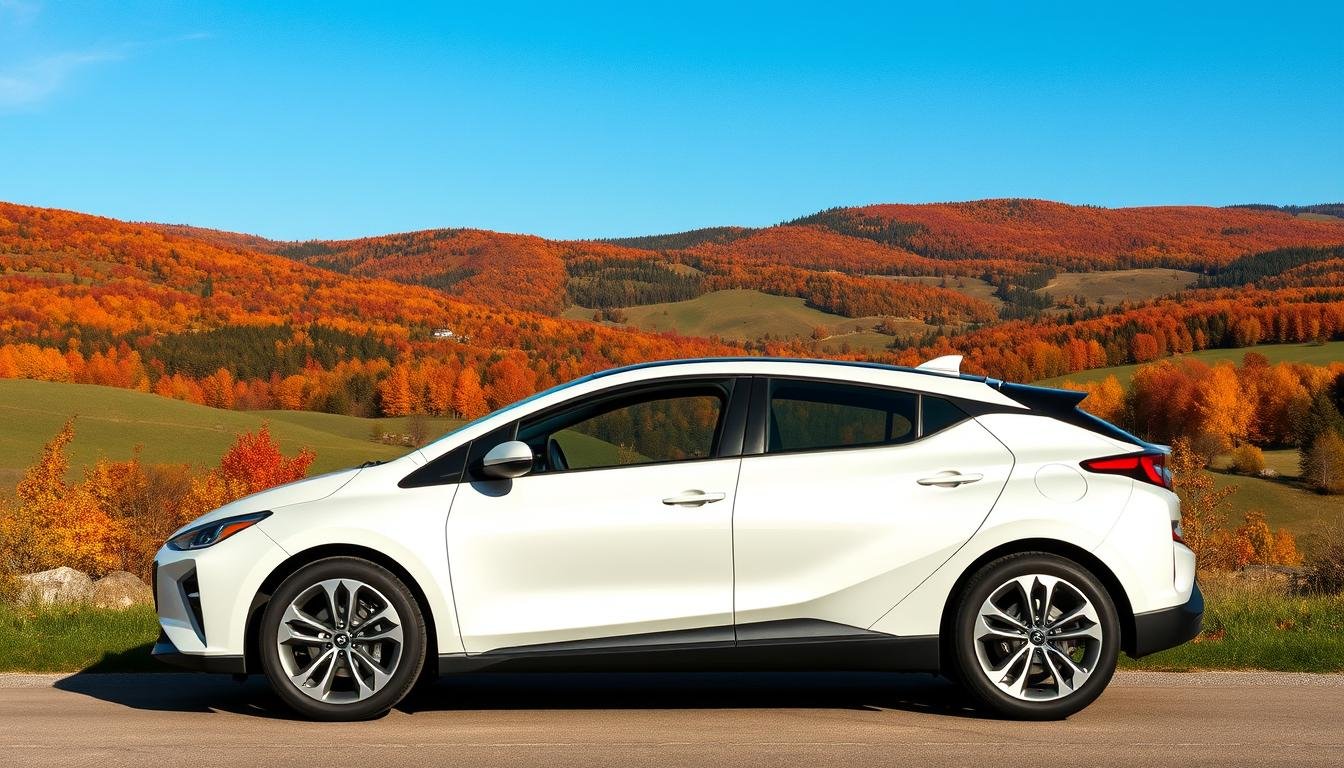Did you know that hybrid vehicles accounted for nearly 10% of all new vehicle registrations in Canada in 2022? This statistic highlights the rapid expansion of the hybrid car market. More Canadians are opting for eco-friendly cars that balance sustainability with practicality. The growing awareness of fuel efficiency and environmental impact is driving the demand for hybrid vehicles. In this article, we will explore Canada’s leading hybrid vehicles, their distinct advantages, and their role in creating a greener future.
Key Takeaways
- Hybrid vehicles represent a significant portion of new car sales in Canada.
- Consumers are increasingly prioritizing fuel efficiency and eco-friendliness.
- Advancements in hybrid technology are expanding choices for car buyers.
- Hybrid vehicles offer a combination of practicality and sustainability.
- Understanding hybrid vehicles is essential for making informed purchasing decisions.
What is a Hybrid Vehicle?
A hybrid vehicle integrates traditional internal combustion engines with electric motors, offering a more efficient and eco-friendly driving option. This combination enhances fuel efficiency and minimizes emissions, appealing to Canadian drivers looking for sustainable alternatives. The hybrid engine is pivotal, enabling the vehicle to seamlessly transition between gasoline and electric power.
Definition of Hybrid Vehicles
Hybrid vehicles operate on a dual power system, combining an internal combustion engine with an electric motor. This setup allows for superior fuel efficiency compared to conventional cars. By leveraging hybrid technology, drivers benefit from both power sources, reducing environmental impact.
How Hybrid Vehicles Work
Hybrid vehicles employ advanced technologies to optimize fuel consumption. The hybrid engine leverages the electric motor and gasoline engine synergistically, reducing fossil fuel reliance. Key components include:
- Regenerative braking: Captures energy lost during braking and stores it in the vehicle’s battery.
- Energy management systems: Controls the interaction between engines for optimal performance and efficiency.
- Switching between power sources: Alternates between electric-only mode and combined engine power based on driving conditions.
Types of Hybrid Vehicles
There are various hybrid vehicles to suit different consumer needs:
- Traditional hybrids: Use both electric motor and gasoline engine for propulsion, switching automatically as needed.
- Plug-in hybrids: Can be charged from external power sources, offering longer all-electric ranges than traditional hybrids.
- Mild hybrids: Feature a smaller electric motor that assists the gasoline engine but cannot operate independently.
Benefits of Driving Hybrid Vehicles
Hybrid vehicles present numerous advantages, appealing to those who prioritize environmental sustainability and seek cost-effective transportation. Beyond mere fuel savings, they offer substantial reductions in environmental impact and financial benefits through government incentives.
Fuel Efficiency and Cost Savings
The primary benefit of hybrid vehicles lies in their exceptional fuel efficiency. Combining an electric motor with an internal combustion engine, they significantly reduce fuel consumption. This results in lower monthly fuel expenses, positioning them as an economically prudent choice. Consequently, hybrid cars contribute to overall cost savings for drivers by minimizing gasoline usage.
Environmental Impact
Hybrid vehicles are pivotal in reducing greenhouse gas emissions, compared to traditional combustion-engine vehicles. By emitting fewer emissions, they play a critical role in combating climate change. Drivers who value environmental conservation appreciate the role hybrids play in minimizing carbon footprints, contributing to cleaner air and a healthier planet for generations to come.
Tax Incentives and Rebates
Various governments incentivize the shift to sustainable driving with tax incentives and rebates for hybrid car purchases. Canadian consumers can benefit from these financial aids, which can substantially reduce the cost of acquiring a new hybrid vehicle. Such support enhances the appeal of hybrid vehicles for those contemplating an eco-friendly upgrade.
Top Hybrid Vehicles in Canada for 2023
In Canada, the demand for eco-friendly cars is on the rise, with 2023 offering a plethora of hybrid options. The market’s growth is fueled by technological advancements and heightened consumer awareness. Below, we highlight some of the most notable hybrid models, showcasing their commitment to efficiency, innovation, and style.
Toyota Prius
The Toyota Prius is a cornerstone in the hybrid car market. It is celebrated for its outstanding fuel efficiency, blending practicality with state-of-the-art technology. Its spacious interior and reputation for dependability make it a favorite among families and city residents.
Honda Insight
The Honda Insight is distinguished by its sleek appearance and superior fuel economy. This hybrid vehicle offers a smooth ride and impressive performance. Its sophisticated interiors and advanced safety features make it a sought-after option for those desiring an eco-friendly car that doesn’t sacrifice style.
Ford Escape Hybrid
The Ford Escape Hybrid is ideal for those requiring versatility. It combines ample space and functionality with exceptional fuel efficiency. This compact SUV is perfect for families, offering a generous cargo capacity. Its rugged design and eco-friendliness make it a standout choice for 2023.
Comparing Hybrid vs. Conventional Vehicles
Understanding the differences between hybrid vehicles and conventional cars is crucial for making an informed purchase. Hybrid vehicles combine an internal combustion engine with an electric motor. This combination offers advantages in fuel efficiency, maintenance costs, and overall performance.
Fuel Economy Comparison
Fuel-efficient cars, such as hybrids, outperform conventional models in terms of mileage. Hybrids use both their electric motor and gasoline engine to boost fuel economy. This dual system enables drivers to achieve impressive miles per gallon, making them highly appealing in today’s market. The lower fuel consumption of hybrids results in significant cost savings over time.
Maintenance Costs
Maintenance costs are another area where hybrids excel. They generally incur lower expenses due to their simpler electric components. Unlike conventional cars, which require regular oil changes and complex engine repairs, hybrids have fewer moving parts. This leads to reduced wear and tear, resulting in lower maintenance costs for owners.
Performance and Comfort
In terms of performance, hybrids have made significant advancements. Many drivers find that hybrid models offer a smooth, quiet ride, comparable to conventional vehicles. Despite initial concerns about power, modern hybrids support robust acceleration and handle well under diverse driving conditions.
Hybrid SUV Options Available in Canada
In Canada, the demand for hybrid SUVs is on the rise. Consumers seek vehicles that are spacious yet fuel-efficient. These eco-friendly cars merge the comfort of larger vehicles with the efficiency of hybrid technology. They represent a smart choice for drivers who prioritize environmental sustainability.
Toyota RAV4 Hybrid
The Toyota RAV4 Hybrid is renowned for its outstanding performance and ample cargo space. It combines robust power with remarkable efficiency, solidifying its position in the market. The RAV4 Hybrid’s advanced hybrid technology ensures a seamless driving experience, while also reducing fuel expenses.
Hyundai Tucson Hybrid
The Hyundai Tucson Hybrid is a stylish choice that merges modern design with cutting-edge technology. This eco-friendly car not only boasts a sleek appearance but also enhances the driving experience with its fuel-efficient performance. It is equipped with the latest safety and infotainment features, catering to diverse driver preferences.
Ford Bronco Sport Hybrid
The Ford Bronco Sport Hybrid is ideal for those who cherish ruggedness. This hybrid SUV maintains the Bronco’s adventurous essence while incorporating hybrid technology for enhanced fuel efficiency. It offers robust off-road capabilities alongside the benefits of an eco-friendly car, making it ideal for exploring Canada’s vast outdoors.
The market for hybrid SUVs is expanding, offering a range of models to suit various lifestyles. For detailed insights into the best options, refer to this guide to efficient hybrid SUVs. This segment highlights the versatility and appeal of hybrid vehicles in Canada. It allows drivers to make sustainable choices without sacrificing performance or comfort.
The Rise of Plug-In Hybrid Vehicles

The allure of plug-in hybrid vehicles is intensifying, driven by consumer demand for alternatives to traditional gasoline-powered cars. These vehicles integrate electric and gasoline power, appealing to those aiming to diminish their carbon footprint without compromising on convenience.
What is a Plug-In Hybrid?
A plug-in hybrid vehicle can be charged via an external power source, such as a standard electrical outlet or a dedicated charging station. This feature enables drivers to engage in electric-only driving for shorter distances. It also ensures a gasoline engine is available for longer trips. The hybrid design is crafted to enhance efficiency, offering drivers substantial hybrid car benefits.
Key Benefits of Plug-In Hybrids
Plug-in hybrids present numerous advantages:
- Extended electric ranges, enabling more driving on electric power alone, which diminishes gasoline reliance.
- Lower fuel costs, resulting from home charging and greater efficiency in electric operation.
- Environmental benefits, contributing to reduced greenhouse gas emissions compared to conventional vehicles.
- An improved driving experience, blending electric and gasoline performance.
Popular Plug-In Hybrid Models
Several models have gained traction in the Canadian market:
- Toyota Prius Prime: Renowned for its efficient design and user-friendly technology.
- Honda Clarity Plug-In Hybrid: Features a spacious interior and a smooth driving experience.
- Ford Escape Plug-In Hybrid: A versatile option, combining SUV utility with hybrid efficiency.
Understanding Hybrid Vehicle Technology
Hybrid vehicles mark a significant leap in automotive innovation, merging traditional engines with cutting-edge electric systems. This synergy boosts efficiency and slashes emissions, positioning them as an eco-friendly alternative. The following elements are pivotal in hybrid technology’s success.
Electric Motor and Battery
The core of hybrid vehicles lies in their electric motor and advanced battery setup. This duo enhances power and fuel efficiency. At low speeds, hybrids can run solely on electric power, offering a quiet, emission-free ride. The battery recharges through regenerative braking and the engine, extending range without the need for frequent charging.
Regenerative Braking
Regenerative braking stands out as a hybrid innovation. It captures braking energy, converting it into electrical power to recharge the battery. This innovation boosts energy efficiency and reduces fossil fuel reliance, lowering emissions.
Energy Management Systems
Hybrids boast advanced energy management systems that optimize performance under various driving conditions. These systems efficiently switch between electric and gasoline power, ensuring peak efficiency. This technology is key to better fuel economy and environmental stewardship. For those seeking options, exploring local used hybrid vehicles can be enlightening.
Future Trends in Hybrid Vehicles
The hybrid car market is poised for significant growth, driven by technological advancements and shifting consumer preferences. Innovations in battery technology are pivotal, enhancing both performance and efficiency. These developments are set to redefine the industry, making hybrid vehicles more attractive to buyers.
Advances in Battery Technology
Recent breakthroughs in battery technology are revolutionizing hybrid vehicles. The emphasis on *lithium-ion* and *solid-state batteries* aims to increase energy density and lower costs. This progress not only improves performance but also fosters greater sustainability.
Growing Market Demand
Environmental consciousness and economic factors are fueling the hybrid car market’s expansion. As people seek *eco-friendly* transportation, hybrid vehicles gain popularity. Government incentives are boosting demand, prompting manufacturers to meet rising consumer expectations.
Upcoming Hybrid Models
Several innovative hybrid models are on the horizon for the Canadian market. Brands like Toyota, Honda, and Ford are at the forefront, introducing vehicles with advanced features, better fuel efficiency, and modern designs. The anticipation surrounding these models underscores the ongoing evolution of hybrid vehicles.
Common Myths About Hybrid Vehicles

Exploring the realm of hybrid vehicles often sparks numerous inquiries, fueled by widespread misconceptions about this cutting-edge technology. By debunking these myths, we uncover the genuine essence of hybrid cars. This reveals their manifold advantages and capabilities across diverse driving conditions.
Misconceptions About Maintenance
Many believe that hybrid vehicles necessitate more complex maintenance than their conventional counterparts. However, this notion is largely unfounded. Hybrids typically boast fewer mechanical components and thus, require less upkeep. Key aspects to consider include:
- Hybrids often feature longer intervals between oil changes.
- Less wear and tear on brakes due to regenerative braking systems.
- Access to warranties that cover components like batteries.
Performance Myths
Another pervasive myth posits that hybrid cars are less powerful than traditional vehicles. This hybrid vehicle misconception is entirely unfounded. Many hybrids deliver remarkable performance, sometimes surpassing that of conventional cars. The reasons behind these hybrid car benefits include:
- Instant torque from electric motors enhances acceleration.
- Smooth and quiet operation for a comfortable driving experience.
- Advanced engineering that balances fuel efficiency with performance.
Understanding Charging Needs
Concerns about charging requirements often plague owners of plug-in hybrids. Some believe daily charging is a must. Yet, this is not universally true. Key points to alleviate these concerns include:
- Many plug-in hybrids can operate effectively on gasoline alone.
- Home charging stations offer convenience for daily use.
- Flexibility in charging options allows for varied driving habits.
Buying Guide for Hybrid Vehicles
Acquiring a hybrid vehicle necessitates a thorough examination of several elements to guarantee a choice that aligns with your requirements. The increasing allure of eco-friendly cars underscores the importance of scrutinizing energy efficiency ratings, pricing structures, and warranty specifics. These factors are pivotal in the acquisition process.
Factors to Consider
When contemplating the purchase of a hybrid vehicle, it is imperative to focus on these critical aspects:
- Energy Efficiency: Examine the miles per gallon (MPG) rating to assess fuel consumption.
- Pricing: Evaluate both the initial cost and ongoing expenses, encompassing insurance and maintenance.
- Warranty Options: Seek warranties that encompass both hybrid components and conventional vehicle parts.
New vs. Used Hybrid Vehicles
The choice between a new or pre-owned hybrid vehicle profoundly impacts your experience:
- New Hybrid Vehicles: They boast the most advanced technology and comprehensive warranties but come at a premium.
- Used Hybrid Vehicles: Generally more budget-friendly, they may include certified pre-owned models, offering enhanced assurance.
Financing Options
Grasping the available financing options can streamline the acquisition journey:
- Loans: Banks and credit unions frequently provide loans tailored for hybrid vehicles.
- Leasing: Leasing presents a flexible alternative, enabling you to operate a new eco-friendly car without enduring a prolonged obligation.
Where to Buy Hybrid Vehicles in Canada
In Canada, the landscape for hybrid vehicle purchases is rich and varied. Reputable dealerships, dedicated to hybrid models, cater to a broad spectrum of consumers. The advent of online shopping has streamlined the process, enabling buyers to compare prices and offers from home.
Dealerships to Consider
Local dealerships stand out as premier destinations for hybrid enthusiasts. Brands such as Toyota, Honda, and Ford prominently showcase their hybrid offerings. Prospective buyers can engage in hands-on experiences, including test drives, at these locations. Additionally, dealerships often provide exclusive incentives, enriching the purchase journey.
Online Shopping Options
The digital realm has transformed the hybrid vehicle acquisition process. Online platforms empower users to explore listings, peruse reviews, and finalize purchases without leaving their homes. AutoTrader exemplifies this, offering a vast array of hybrid vehicles that align with diverse budgets and preferences. This approach ensures convenience and clarity in the buying experience.
Certified Pre-Owned Programs
For those seeking a cost-effective route, certified pre-owned vehicles present an attractive option. These programs, offered by dealerships, feature vehicles that have undergone rigorous inspections and come with extended warranties. This assurance provides buyers with confidence in their investment, balancing affordability with dependability.
Hybrid Vehicle Safety Ratings

Understanding safety ratings is crucial when considering a hybrid vehicle purchase. These ratings offer insights into crash test performance and other safety evaluations. The National Highway Traffic Safety Administration (NHTSA) conducts thorough assessments to evaluate reliability and safety features. This information aids consumers in making well-informed decisions about hybrid vehicle safety.
Importance of Safety Ratings
Safety ratings are pivotal in consumer decision-making. They reflect a vehicle’s ability to protect occupants during accidents. High ratings often signify advanced safety technologies and robust construction. For families and safety-conscious drivers, these ratings provide reassurance.
Top Safety Picks for 2023
Several hybrid models have received outstanding safety ratings. The Toyota Prius and Honda Accord Hybrid are notable for their superior crash test results and safety features. These vehicles have been praised for their dedication to hybrid vehicle safety, earning recommendations from safety organizations.
Emergency Features in Hybrid Vehicles
Hybrid vehicles are equipped with numerous emergency features to safeguard occupants in critical situations. These include:
- Advanced airbag systems that adapt to the severity of a collision
- Antilock braking systems (ABS) for enhanced control during sudden braking
- Electronic stability control to help maintain traction
- Adaptive cruise control and lane-keeping assist technologies that enhance overall safety
By integrating these advanced features, hybrid vehicles prioritize safety while enhancing the driving experience for all occupants.
Environmental Benefits of Hybrid Vehicles
Hybrid vehicles offer a solution to our dependence on fossil fuels, significantly reducing environmental harm. They integrate cutting-edge technology to lower emissions, benefiting both the driver and the planet.
Reducing Carbon Footprint
Hybrid vehicles are key in reducing carbon footprints. They combine an internal combustion engine with an electric motor, boosting fuel efficiency. This results in lower fuel costs and less harmful emissions, making them eco-friendly.
By choosing a hybrid, individuals contribute to a healthier environment. They actively reduce their carbon footprint, supporting global sustainability efforts.
Impact on Urban Air Quality
Urban pollution is a major issue, caused by high traffic and conventional vehicles. Hybrid cars help mitigate this problem. With fewer emissions, cities see better air quality, improving residents’ health.
Cleaner air enhances quality of life and may lower healthcare costs. It’s a step towards a healthier urban environment.
Sustainable Driving Practices
Combining hybrid vehicles with sustainable driving practices amplifies environmental benefits. Simple actions like proper tire pressure, using cruise control, and avoiding idling boost fuel efficiency. These habits enhance hybrid technology’s effectiveness.
They also encourage an eco-conscious lifestyle. For more on sustainable driving, experts offer valuable advice.
Hybrid Vehicles and Winter Driving in Canada
Winter driving in Canada poses unique challenges for hybrid vehicles. Cold weather can diminish battery efficiency and alter vehicle behavior on icy roads. It is crucial to grasp these dynamics to ensure a safe and efficient winter driving experience.
Performance in Cold Weather
Hybrid vehicles are engineered to handle diverse driving conditions. In cold weather, the gasoline engine may engage more often, aiding the electric motor. This strategy helps mitigate the electric range reduction due to low temperatures. Although drivers might experience slower acceleration at first, the vehicle’s overall performance remains strong. Regular use and maintenance can significantly boost performance during winter.
Maintenance Tips for Winter
Proper maintenance is critical for hybrid vehicles during winter. Here are some essential maintenance tips to keep your vehicle in optimal condition:
- Ensure the heating system operates effectively.
- Regularly check battery levels and the condition of electric components.
- Inspect the brakes and overall brake system to prepare for slippery conditions.
Proactive maintenance will enhance hybrid vehicle winter performance and prevent potential issues on the road.
Choosing the Right Tires
Choosing the right tires is essential for improved grip and safety. Opt for winter tires specifically designed for cold weather conditions. They offer superior traction on snow and ice. Ensure the tires have a winter rating and are compatible with hybrid vehicles. Maintaining the correct tire pressure is also crucial, as cold temperatures can cause it to drop, affecting performance and safety.
Conclusion: Why Choose a Hybrid Vehicle in Canada
Our exploration of hybrid vehicles reveals benefits that extend beyond initial costs. With fuel prices increasing and environmental concerns growing, the long-term financial advantages of hybrid ownership are undeniable. These eco-friendly cars offer superior fuel efficiency and require less maintenance than traditional gasoline vehicles. This leads to significant cost savings over time.
Choosing a hybrid vehicle also contributes to a greener future. They play a key role in reducing greenhouse gas emissions and improving urban air quality. As the hybrid car market in Canada expands, consumers find more options that align with their lifestyle and environmental values.
In summary, opting for a hybrid vehicle is more than a personal choice; it’s a commitment to a healthier planet. The numerous benefits discussed make it a compelling option for prospective buyers. Embracing hybrid technology is a significant step towards sustainable transportation. It has profound effects on both personal finances and the environment.
